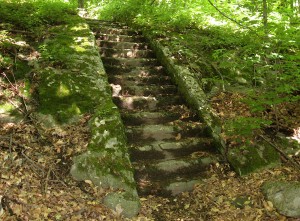Jun 20 2011
Natural versus Artificial
 While I was out walking the other day, I came upon a curious phenomenon. A well-worn, earthen trail cutting through the woods suddenly came to a set of stairs that someone had painstakingly carved from rock. My first thought: Why go to so much trouble? Once I got beyond that, though, I marveled at the result. Moss and lichen had crept from uncut stone to cut, making me wonder what difference there is really between the natural and the man-made.
While I was out walking the other day, I came upon a curious phenomenon. A well-worn, earthen trail cutting through the woods suddenly came to a set of stairs that someone had painstakingly carved from rock. My first thought: Why go to so much trouble? Once I got beyond that, though, I marveled at the result. Moss and lichen had crept from uncut stone to cut, making me wonder what difference there is really between the natural and the man-made.
Homo faber – we are the creatures who make things. We manipulate the material world with such profound consequences that the word “artificial” had to be invented. In the strictest sense, we are as much a part of nature as the wild animals whose paths we follow through the woods, the plants that grow all around us, the birds overhead or the insects below our feet. And yet we stand apart from it. What separates us? Our inventions and contrivances, of course.
There is beauty in integration with nature, certainly. The architectural wonders of Frank Lloyd Wright come to mind, as do the many stone monuments left behind by our ancestors. But these are the exceptions to the rule. Generally speaking, most man-made structures – buildings, roads or whatever – are striking in their radical break from the landscape. Rare indeed is the developer who gives any thought at all to wild aesthetics. Architectural renderings of would-be structures are usually accented with neat rows of trees and strategically placed green space, but the beauty the builder sees is all in the artifice – the perfectly straight or intentionally curved line – not wild anarchy. And so it is with most things human, from the automobile to the ipod.
Philosophically, I have struggled with this for decades. At the very heart of the matter are the very qualities that make us human. More than any other creature, we manipulate our environment, making a rough and ready world more user-friendly, better suited to our wants and needs. And yet we do so at our great peril – one that first became apparent to us in the 19th century, when the industrial world suddenly sprung to life and the idea of wilderness transformed from something threatening to something idyllic. Now it is quite possible that we may lose ourselves in our grand designs, reaching a point where stairways cut from stone will seem ridiculously quaint. Then the word “wild” will lose all meaning, and the entire planet will have our mark on it. What’s to stop us?
Comments Off on Natural versus Artificial

